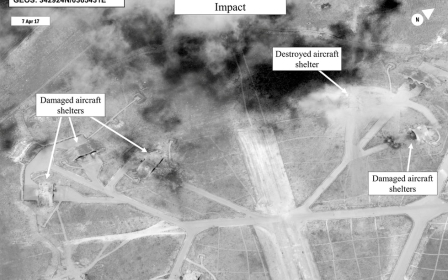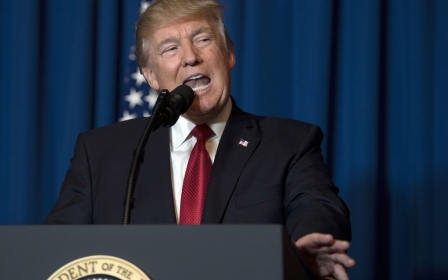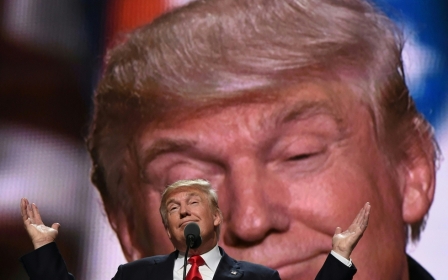With mild reaction to US Syria strikes, Russia still seeks warm relations with Trump

Russia’s reaction to US President Donald Trump’s missile strike on a Syrian air base was as mild as could be expected from a government that is still eagerly anticipating its first date with the new US administration.
The Kremlin is desperate not to say or do anything which would prompt Rex Tillerson, the US secretary of state, to cancel his planned visit to Moscow next week. The meeting is seen as crucial in setting the tone and agenda for US-Russian relations under the new administration.
The number one issue for Moscow remains the state of US-Russia relations
The Russians are, of course, alarmed that Trump struck an air base belonging to their Syrian ally and have made that publicly clear. But, without saying this bit out loud, they are pleased that the US warned them of the impending strike and did everything possible to avoid hitting the part of the base that houses Russian military personnel.
This was a clear signal that Washington still wants to explore options for a constructive relationship with Vladimir Putin, who is eager to respond in kind.
A slap on the wrist
Moscow was euphoric when Trump was elected, given his campaign statements in praise of Putin and the poor state relations with Washington had reached under Barack Obama. Since then, the Russian mood has sobered considerably.
The Kremlin has seen the fierce anti-Russian campaign that Trump’s victory has unleashed in Washington as well as the splits within Trump’s entourage over how to treat Russia and whether to lift sanctions imposed after the Ukraine crisis. They believe the so-called deep state in Washington - which is centred on the nexus among the top military brass, arms manufacturers and intelligence agencies - is doing all it can to restrain Trump and pull him back into traditional channels.
So the Kremlin has done as little as possible in the last few hours to antagonise Trump. Its decision to suspend the “deconfliction” arrangements under which the Russian and US air forces informed each other of their flight paths over Syria is no more than a slap on the wrist. It will make little practical difference since there are few flights in shared space anyway. In any case, the arrangements can be quickly reinstated.
The announcement of a beefing-up of Syria’s air defences is also little more than words, though there is always the risk of a clash if the Americans were to repeat the strikes. But Trump also knows this, which is why he would stick to using cruise missiles rather than manned aircraft.
Repeat performance?
A key issue for the Kremlin is whether Trump will repeat his action and whether his promise that the strikes were limited, narrowly focused and a one-off retaliation for the chemical incident will be maintained. It will hope to get an answer during next week’s visit by Tillerson.
The Kremlin’s condemnation of the attack as an act of aggression and a violation of international law was a predictable formality. Its phrase that Trump was making “a far-fetched pretext” out of the chemical attack was also to be expected.
The number one issue for Moscow remains the state of US-Russia relations. There was a significant toning-down of Russian statements over the course of Friday.
Friday’s cruise missiles, by themselves, will not be a game-changer but they will probably help to prolong the Syrian war
In his first statement, put out by the Kremlin at 9am, Putin said the strike had “dealt a serious blow” to Russian-US relations. A few hours later, after Putin had chaired his security council, the Kremlin said the meeting’s participants felt “it is highly regrettable that bilateral Russian-US relations were damaged”.
This was a clear softening of the line, replacing anger with sorrow, and suggesting the consequences could be repaired.
Reinvigorated opposition
A secondary issue for the Kremlin is the effect of the strike on the war in Syria. Moscow was already disappointed with the Trump administration’s failure to cut aid and weapons supplies to the Islamist rebels fighting Assad during the US president’s first seventy days in office. It had also seen no effort by Washington to press the opposition’s negotiators to go to Geneva without preconditions.
Russian diplomats have been working hard to find formulas that would lead to a coalition government in Damascus with reduced powers for Assad, but the opposition continues to reject them. It still insists that Assad’s departure must be immediate or at least guaranteed to occur within a few months.
Trump’s missile strikes have emboldened the opposition, thereby reducing the prospects for a successful outcome at Geneva.
Now that they have tasted blood, they will no doubt be hoping that Trump will strike again. Since the war started, the anti-government militants have been hoping for a repeat of NATO's military intervention in Libya, with US air power coming in to defeat Assad.
Disappointed by Obama, they were hoping for better under Trump. Friday’s cruise missiles, by themselves, will not be a game-changer; if anything, they will probably help to prolong the Syrian war.
After losing their stronghold in eastern Aleppo three months ago, the militants were conducting a rearguard action in the Damascus suburbs. Thanks to Trump they will feel re-invigorated now - as will the Gulf states and Turkey that have helped the militants for the last several years.
- Jonathan Steele is a veteran foreign correspondent and author of widely acclaimed studies of international relations. He was the Guardian's bureau chief in Washington in the late 1970s, and its Moscow bureau chief during the collapse of communism. He has written books on Iraq, Afghanistan, Russia, South Africa and Germany, including Defeat: Why America and Britain Lost Iraq (I.B.Tauris 2008) and Ghosts of Afghanistan: the Haunted Battleground (Portobello Books 2011).
The views expressed in this article belong to the author and do not necessarily reflect the editorial policy of Middle East Eye.
Photo: Russian President Vladimir Putin attends a meeting with his Belarusian counterpart in Saint Petersburg on 3 April (AFP)
Stay informed with MEE's newsletters
Sign up to get the latest alerts, insights and analysis, starting with Turkey Unpacked
Middle East Eye delivers independent and unrivalled coverage and analysis of the Middle East, North Africa and beyond. To learn more about republishing this content and the associated fees, please fill out this form. More about MEE can be found here.






